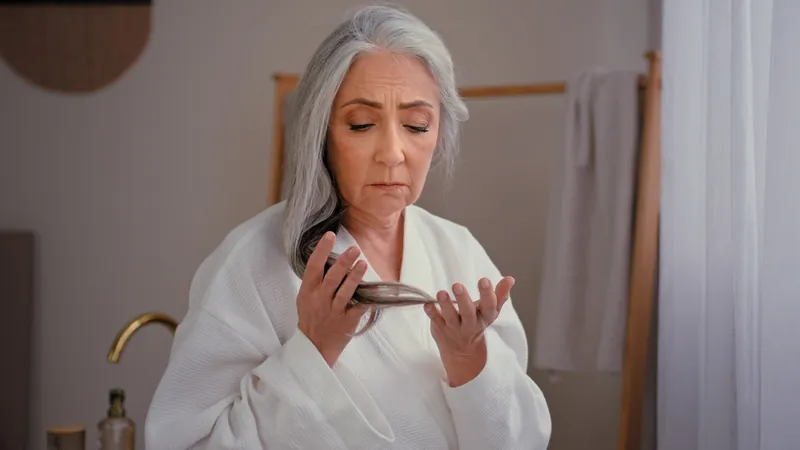
Uncover the 5 Common Mistakes Older Women Make That Can Lead to Hair Loss – And How to Fix Them!
2024-12-14
Author: Ling
Introduction
As we age, hair loss can become a distressing reality for many women, with thinning hair often intertwined with the natural aging process. The medical community refers to this phenomenon as alopecia, which encompasses various forms of hair loss, including androgenetic alopecia, commonly known as pattern baldness, and traction alopecia, caused by the damage from tight hairstyles.
Many factors can contribute to hair loss. While certain medical conditions and medications—such as those used for cancer treatment or heart disease—can lead to hair thinning, lifestyle choices may unknowingly amplify the issue, particularly in older women. Dr. John Kahen, a hair restoration expert in Beverly Hills, sheds light on how lifestyle habits and hair care choices can worsen hair loss, providing essential insights to help combat this issue.
1. Misleading Haircare Products
One of the most significant contributors to hair loss is the use of harsh haircare products. With an influx of options flooding the market, it's vital to scrutinize the ingredients in your shampoos and conditioners. Dr. Kahen emphasizes the importance of avoiding harmful chemicals like formaldehyde and sodium lauryl sulfate. These ingredients can damage hair and exacerbate thinning. Surprising as it may seem, even keratin treatments, which are often perceived as benefitting hair health, can lead to breakage when combined with heat styling.
2. The Impact of Tight Hairstyles
Common sense suggests that certain hairstyles can place extreme stress on hair follicles. Styles like tight ponytails or intricate braids can lead to traction alopecia, particularly in older women. Dr. Kahen warns that while a tight hairstyle on occasion may not cause significant harm, consistent use can lead to irreversible hair damage. Opting for looser hairstyles will help mitigate stress on the hair roots and prevent unnecessary breakage.
3. Robust Haircare Routines
Dr. Kahen points out that overly rigorous haircare routines—like aggressive brushing and towel-drying—are often overlooked as causes of hair loss. Gentle handling, particularly when hair is wet, is essential to prevent strand damage. Transitioning to softer methods for styling and maintenance will aid in preserving overall hair integrity.
4. Overuse of Heat Styling
While styling tools can enhance our look, excessive heat can result in brittle hair and exacerbate existing hair loss. It's crucial to use these tools smartly, ensuring hair is dry before styling and protecting strands with appropriate heat protectants. Remember, it’s not just about limiting hair loss outright; preventing damage from styling is just as important.
5. Nutrition’s Role in Hair Health
Finally, no discussion about hair loss is complete without addressing nutrition. A well-balanced diet rich in key nutrients—such as biotin, vitamins A, C, D, E, protein, and essential fatty acids—is vital for healthy hair growth. Dr. Kahen advocates adopting a mostly plant-based diet, steering clear of excessive processed foods. Consulting with a nutritionist can provide personalized guidance on achieving a diet that supports hair health.
The Hidden Culprit: Stress
Above all, while managing hair health through diet and care products is crucial, one cannot overlook the role of stress in hair loss. Dr. Kahen observes a notable correlation between high stress levels and hair thinning. Incorporating stress-reducing practices like meditation, exercise, and yoga can greatly benefit not only mental health but also physical wellness—including hair vitality.
Conclusion
In conclusion, while some causes of hair loss may be beyond our control, understanding the mistakes that could contribute to the problem is key to promoting healthy hair as we age. By making informed choices in haircare, hairstyles, nutrition, and stress management, older women can significantly improve their chances of maintaining a full head of hair. Action starts now—are you ready to take your hair health seriously?




 Brasil (PT)
Brasil (PT)
 Canada (EN)
Canada (EN)
 Chile (ES)
Chile (ES)
 España (ES)
España (ES)
 France (FR)
France (FR)
 Hong Kong (EN)
Hong Kong (EN)
 Italia (IT)
Italia (IT)
 日本 (JA)
日本 (JA)
 Magyarország (HU)
Magyarország (HU)
 Norge (NO)
Norge (NO)
 Polska (PL)
Polska (PL)
 Schweiz (DE)
Schweiz (DE)
 Singapore (EN)
Singapore (EN)
 Sverige (SV)
Sverige (SV)
 Suomi (FI)
Suomi (FI)
 Türkiye (TR)
Türkiye (TR)